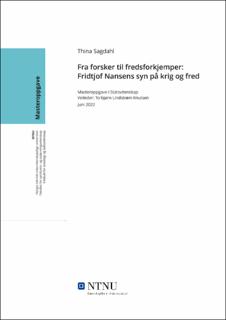Fra forsker til fredsforkjemper: Fridtjof Nansens syn på krig og fred
Master thesis
Permanent lenke
https://hdl.handle.net/11250/3018233Utgivelsesdato
2022Metadata
Vis full innførselSamlinger
Sammendrag
Denne avhandlingen er en empirisk analyse av Fridtjof Nansens syn på krig og fred. Med utgangspunkt i problemstillingen «endrer Fridtjof Nansen syn på både krig og fred?», tar oppgaven sikte på å avdekke utviklingen i Nansens syn på krig og fred i løpet av livet. Det analytiske verktøyet er kildekritikken, og ved hjelp av denne, undersøker jeg Nansens artikler, brev, taler og utdrag fra dagbøker i søken etter Nansens krigs og fredsforståelse før, under og etter første verdenskrig. Med tre hypoteser som drivkraft, avdekker analysen en nokså kraftig endring i Nansens syn på krig, og finner tendenser til endring i synet på fred fra en negativ til en mer positiv fredsdefinisjon. Flere forfattere hevder at Fridtjof Nansen har et sosialdarwinistisk verdenssyn. Derfor benytter jeg et kontinuum med Friedrich von Bernhardi og Norman Angell som ytterpunkter for å nyansere bildet av Nansen og hans syn på krig og fred. This thesis is an empirical analysis of Fridtjof Nansen’s view on war and peace. My entry point is the research question “does Fridtjof Nansen change his view on war and peace?”, and I try to uncover this development through Nansen’s life. I use the classical historical method, and the source criticism as analytical tool. The search for Nansen’s understanding of war and peace before, during, and after World War One is based on critical examination of the works of Nansen, such as articles, private letters, speeches, and diary entries. Examining three hypotheses of how Nansen’s view on war and peace develops, the findings illustrate a dramatic change in Nansen’s view on war. During the war, and after, it looks as though Nansen starts operating with a positive definition of peace, although these findings only show a tendency, and are based on a small source material, and can not be said to confirm the hypotheses. Several authors claim that Fridtjof Nansen has a social darwinist view of the world. I therefore use a continuum with Friedrich von Bernhardi and Norman Angell as extremes in a try to nuance the picture of Nansen, and his view on war and peace.
